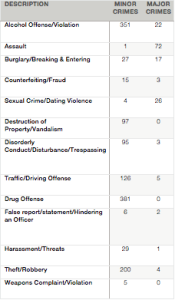Frostburg State University Crime Data
The majority of the crimes FSU students are arrested for are drug and alcohol related. From 2011 to 2016, 736 total arrests were made for substance use. The Frostburg State students that commit these types of crimes are arrested and then cited exactly the same as anywhere else within the state of Maryland. The Frostburg City police reported that about 80% of these crimes were for civil citations, such as noise complaints and alcohol violations, whereas 20% were for major crimes like assault, burglary, etc. In regards to the civil citations, there are two types–the first usually result in fines; these include noise complaints. If cited for a noise complaint, the student can receive a fine for about $125, which can be paid to the police, or the student can go to court if the fine is $500 or more. The second civil citation concerns alcohol; if cited, the student could go to court with a fine of up to $500, but there is generally only a $100 fine for the first offense. On each subsequent offense, the fine doubles until it gets to $500.
The graph and table shown above show that the majority of the crimes committed by Frostburg State students include alcohol, drug, and traffic offenses. The crimes are categorized by major and minor offense due to confusion regarding whether the crime was a felony or a misdemeanor. The best way to determine whether a crime was a major or minor offense is whether or not an arrest was made, or if the student was just given a citation.
In the cases of off-campus parties, there is not a specific code followed by the City Police. Instead, each party is handled case-by-case. Most of the time, if the police get a call about a loud party, they will not issue citations until about 11:00 p.m. If they are called earlier, they will break up the party or gathering.
FSU police also don’t have any specific guidelines, except for those set by Academic Affairs for Frostburg State University. The campus police department has a “knock and talk” policy in which the police will talk to the party hosts if there are any issues with a party or the noise level. FSU police cannot enter private property without a warrant or some form of probable cause. The guidelines that they follow are accessible to the public, and they are located within the student code of conduct. Carl W. Crowe of Academic Affairs said, “There are no specific guidelines for off-campus parties outside of observance of local noise ordinances. Per the student code of conduct, students are responsible for off-campus parties, though. That information is outlined in the policy statements.” Based on this information, it seems as though neither the FSU police nor Academic Affairs really know the exact policy for handling off-campus parties.
Based on the collected data, most of the crimes committed by FSU students include drugs and alcohol. While other more serious offenses, such as assaults and sex-related crimes do occur, the data found was from 2011 to 2017, and it did not include all major (felony) charges against FSU students.
Written by Michael Franklin and James Whittington





